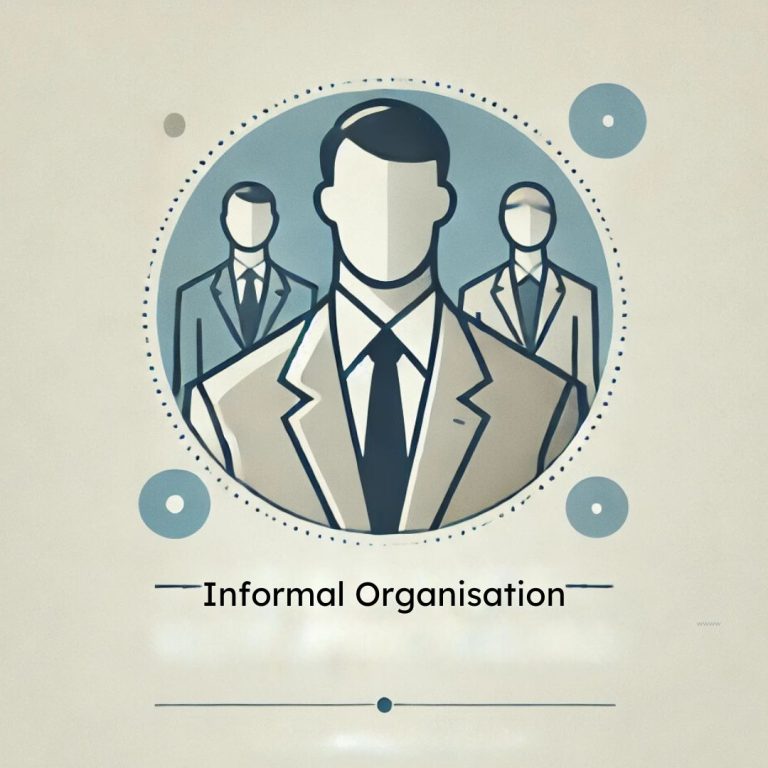Informal organization is a vital part of how people interact and work together in any group or workplace. Even though it is not officially recognized in the structure of an organization, it exists everywhere. Whether it’s an office, a school, a hospital, or even a marketplace, informal organization forms naturally among individuals. It is based on mutual relationships, common interests, emotions, and personal connections. These interactions are not planned by management but still play a major role in making day-to-day work smoother and more efficient.
Unlike formal organizations that are based on official hierarchies and duties, informal organizations focus on human connections. When people work together regularly, they form friendships, trust each other, share information, and even help each other beyond work roles. These unseen yet strong networks form the foundation of informal organizations.
What is an Informal Organisation?
An informal organization refers to the network of personal and social relationships that develop naturally among people within an organization. These relationships are not created or controlled by the management. Instead, they arise on their own due to shared backgrounds, mutual interests, personal friendships, or emotional connections.
In a workplace, even though there is an official structure that defines who reports to whom, people still interact outside of that system. For example, employees from different departments may become friends and help each other. These unofficial interactions and groups form the base of an informal organization.
Informal organizations are not visible in any company charts or documents, but they are real and impactful. They often act as support systems for employees, influence decision-making informally, and sometimes even help spread information faster than official channels.
Features of Informal Organisation
Informal organizations have unique traits which distinguish them from formal ones. Those traits help us understand their functioning and significance.
1. Unstructured and Unplanned
Unlike formal organizations, which are built on a set structure and plan, informal organizations have no fixed shape. They develop naturally over time as people interact more with each other.
2. Based on Social and Personal Relations
Informal organizations are formed due to personal preferences and social needs. People connect with others they feel comfortable with or share common interests with. These relationships are voluntary and emotional.
3. No Official Recognition
There is no official record or chart of informal organizations. They are not documented in company manuals or structures, and management does not create them.
4. Dynamic and Flexible
Informal organizations are very flexible. They keep changing based on people’s attitudes, feelings, and social behaviour. A person may be part of one group today and a different group tomorrow.
5. Spreads Information Quickly
In an informal organization, messages travel faster through gossip or casual conversation. This is often called the “grapevine communication.” While it can spread important news quickly, it can also lead to the spread of rumours.
6. Emotional and Human-Focused
Informal organizations fulfil the emotional needs of employees. People support and motivate each other, which leads to a more relaxed and friendly environment.
Advantages of Informal Organisation
Informal organizations play a very supportive role in the functioning of a business. Although unofficial, they offer several benefits that help both employees and management.
1. Improves Communication
Informal communication is much faster. Employees talk to each other freely, share feedback, and pass on information without hesitation. This ease of communication helps in solving issues quickly.
2. Builds Trust and Team Spirit
Since informal organizations are built on mutual relationships, they create trust and bonding among employees. This trust makes teamwork more efficient and encourages cooperation.
3. Increases Job Satisfaction
Friends give emotional support to employees while they are working in a cohesive group. They reduce stress and increase those feelings of belonging to a social network that translates into higher levels of satisfaction.
4. Encourages Innovation and Ideas
Within informal groups, individuals can express their opinions or sentiments freely without being subjected to any form of judgment. This would result in the stimulation of thoughts with resultant new suggestions and innovative solutions that may be presented to management.
5. Provides Support in Difficult Times
If someone is facing personal or professional challenges, the informal group often acts as a support system. This emotional backing helps maintain overall mental well-being.
Disadvantages of Informal Organisation
Despite its benefits, informal organizations also face certain problems. If not handled properly, these issues can affect the discipline and efficiency of the formal organization.
1. Spreads Rumours and Misinformation
Informal communication is uncontrolled. Therefore, sometimes it embodies false or harmful information, creating confusion and negativity at the workplace.
2. Can Encourage Groupism
Sometimes, people will band into small groups to favour their members. These groups may lead to bias and unfairness, and perhaps even in conflict with others.
3. Resistance to Change
When management introduces a new policy or change, informal groups may resist it, especially if it affects their interests or breaks their comfort zone.
4. No Responsibility or Accountability
Since informal organizations are unofficial, no one is responsible for actions taken under them. If something goes wrong, it’s hard to hold anyone accountable.
5. Affects Formal Structure
Too much dependency on informal systems can disturb the formal work process. Employees may start ignoring rules and guidelines, leading to discipline problems.
Types of Informal Organisation
Informal organizations can be grouped into types depending on how the relationships are formed.
1. Horizontal Informal Organisation
At the same level of hierarchy, they are those employees working in the department. They develop their relationships through shared working experiences, lunch breaks, or similar roles.
2. Vertical Informal Organisation
Here, people from different levels of authority form informal relations. For example, a junior employee may have a strong bond with a senior manager due to mutual respect or shared interests.
3. Mixed Informal Organisation
This type involves people from various departments and levels who connect because of common hobbies, social activities, or personal relations, like carpooling or gym groups.
Example of Informal Organisation
Let’s take a real-world example to understand how informal organizations work.
Imagine a large IT company. Although the company has a formal structure with clear job roles, a group of employees from different teams often meets during lunch breaks. Over time, they develop strong bonds. They share ideas, help each other solve coding problems, and support each other in personal matters, too. One day, a problem arises in a project, and even though it’s not part of their duty, one of them offers help and solves it. This is the power of an informal organization—it helps beyond formal limits.
Functions of Informal Organisation
Informal organizations serve several important functions that support the formal system and improve overall performance.
1. Quick Communication
Informal groups help pass information much faster than official channels. People are more open to listening and responding when the message comes from a friend or known person.
2. Boosts Motivation
Being part of a friendly group encourages people to perform better. They feel valued and supported, which boosts morale and productivity.
3. Fills Gaps in Formal Structure
Sometimes, formal organizations fail to address emotional or practical needs. Informal groups help fill these gaps by providing support and suggestions that management may not be aware of.
4. Promotes Cooperation
Informal organizations create harmony among members. Employees tend to help each other, reducing conflicts and misunderstandings.
Importance of Informal Organisation
An informal organization is important because it brings the human element into the workplace. It creates an environment where people care for each other and go beyond just doing their jobs.
It improves the overall efficiency of formal systems by adding flexibility and human connection. Employees are more engaged and likely to stay in the company when they feel emotionally supported. Informal organizations also help managers understand what’s really happening in the team, giving them insights they wouldn’t get through official reports.
In short, informal organization makes the workplace more connected, human, and balanced.
Difference Between Informal and Formal Organisation
Formal and informal organisations are two essential aspects of any working environment. While both exist within the same workplace, they are quite different in nature, purpose, and functioning. A well-balanced organisation benefits from both, as one provides structure and discipline, and the other brings flexibility and human touch. Let’s explore their differences in detail:
| Aspect | Formal Organisation | Informal Organisation |
| Formation | Created by management based on rules | Forms naturally among individuals |
| Structure | Has clear roles, hierarchy, and authority | No fixed structure or roles |
| Communication | Official and slow | Fast and often through gossip |
| Purpose | Achieve organisational goals | Fulfil social and emotional needs |
| Accountability | Each member is responsible | No clear accountability |
| Flexibility | Rigid and rule-based | Flexible and adaptable |
| Visibility | Written and documented | Invisible and unwritten |
| Example | Reporting structure in a company | Friends group in the office |
Both formal and informal organisations are important. One ensures discipline, the other adds a human touch.
Informal Organisation FAQs
Q1. What is the role of the informal organization in a company?
The informal organization helps build relationships, improves communication, supports teamwork, and fills emotional gaps that the formal structure may overlook.
Q2. Can informal organizations harm the company?
Yes, if not managed properly, they can lead to gossip, groups, and resistance to change. However, if guided well, they can be very useful.
Q3. How do informal groups affect decision-making?
Informal leaders often influence team opinions, which can impact decisions, even if they are not part of official meetings.
Q4. Is informal communication always bad?
Not at all. While it can spread rumours, it also helps in faster information flow and better employee bonding when used positively.
Q5. What are examples of informal organizations?
Employee lunch groups, carpool groups, or friends from different teams who help each other without any formal command.

